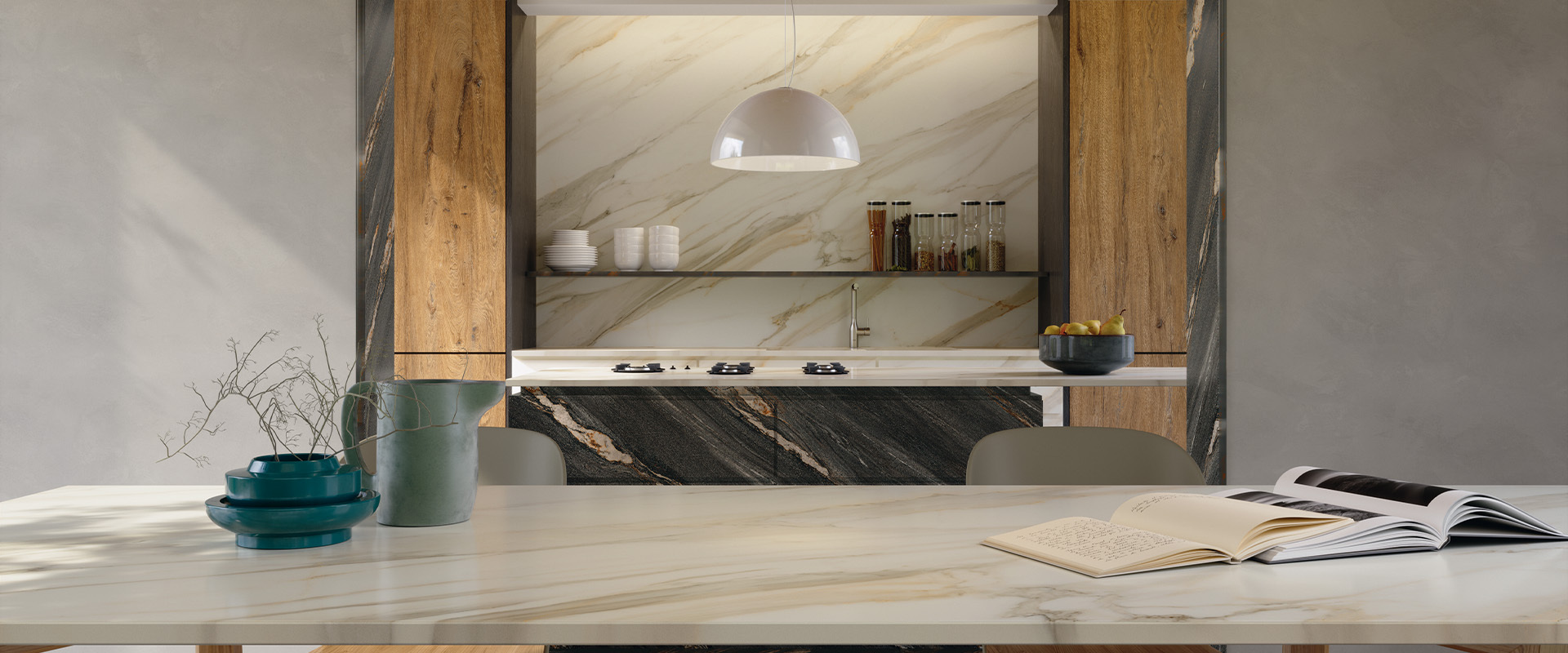
In the kitchen design industry, choosing a worktop material is crucial for ensuring long-term durability and functionality. Given the wide range of materials available on the market today, from classic wooden kitchen worktops to modern and versatile porcelain stoneware, buyers face a challenge: which worktop offers the best performance and withstands everyday wear and tear?
This article attempts to answer this question by taking a closer look at the resistance performance of kitchen worktops made from different materials.
Continue reading.
When assessing the durability of a kitchen worktop, it is essential to consider its resistance to stains and chemicals. Let’s start by looking at how materials differ.
Laminate, which consists of layers of plywood and resins pressed together, is exposed to persistent stains, and certain household chemicals can be corrosive.
Made from a mixture of quartz powder, polymer resins and pigments, quartz kitchen worktops are more resistant than laminate worktops, but may have certain limitations, as they can develop persistent stains.
Wood is naturally porous, allowing substances to penetrate more easily. The finish of wood can be damaged by harsh chemicals, resulting in stains or discoloration.
Marble is porous and can absorb coloured liquids easily, which can lead to permanent stains. Acidic or abrasive substances, such as certain cleaning agents, can damage, dull or corrode the surface.
Granite is a dense and durable natural stone, primarily composed of quartz, feldspar and mica. Regular maintenance is necessary to prevent it from becoming porous and absorbing liquids, which can cause staining.
Porcelain stoneware has a non-porous surface, which means that substances cannot penetrate it, making it easier to clean and preventing permanent stains. It is more resistant to harsh chemicals than other materials.
Kitchen worktops are subject to daily wear and tear, so they must be highly resistant in order to ensure excellent long-term durability.
Laminate worktops can show signs of wear and tear over time, including scratches and discolouration.
Quartz is more resistant than laminate, but quartz worktops can still show signs of wear if sharp or abrasive objects are used on them.
Wooden kitchen worktops are inherently more fragile and can be prone to scratches and dents.
Marble is susceptible to wear and tear, and can easily be scratched or chipped if knocked too hard or if sharp or abrasive objects are used. Marble is a fragile material due to its mineral composition and inherent porosity.
Granite is a robust material, but it may show signs of wear and tear over time. Sharp utensils or hard objects that can scratch the surface should not be used on granite worktops.
Due to its robust composition and compact structure, porcelain stoneware is highly resistant to scratching, abrasion and impact. Natural ceramics are widely preferred to other materials because they retain their structural integrity over time.
Kitchen worktops must be highly durable and non-deformable, as they are often exposed to high temperatures during food preparation.
Laminate will begin to show signs of damage such as cracking or warping if exposed to direct heat.
Although quartz is generally more resistant, it can be irreparably damaged by excessive temperatures.
Wood is sensitive to high temperatures and may become warped or discoloured over time if not treated correctly.
Marble worktops can withstand moderate temperatures, but prolonged exposure to heat can result in damage, such as sealant leaking, and cracks may also form.
Over time, exposure to extreme temperatures and thermal shock will cause cracking or colour changes in granite.
Its robust composition allows it to withstand high temperatures without warping or damaging the structure. Porcelain stoneware is therefore ideal for kitchens as it provides peace of mind when it comes to preparing meals at high temperatures.
Selecting the appropriate worktop material is essential to ensure food safety and hygiene, which are paramount in any kitchen.
Over time, the laminate seal may develop cracks or fissures, which can make the surface porous and more susceptible to contamination.
Wood is a porous material, which means that bacteria can build up on it, making it difficult to keep clean.
Although quartz has a smoother surface than wood or laminate, it may have joints that need to be carefully cleaned.
Granite is porous, so it is likely to accumulate bacteria, especially if the surface is not properly sealed and maintained.
Porcelain stoneware is non-porous, which reduces the risk of bacteria build-up and prevents harmful substances from penetrating the surface. Porcelain stoneware is easy to clean and maintain, ensuring kitchens are hygienic and safe for food preparation.
Learn more about the Active Surfaces® technology used in SapienStone kitchen worktops, which provides surfaces with antibacterial, antiviral, self-cleaning and anti-odour properties.
This analysis compares the resistance and durability of porcelain stoneware to other materials commonly used for kitchen worktops, demonstrating that porcelain stoneware is the superior choice.
Despite the challenges of everyday use, ceramics retain their appearance and structural integrity over time, which is a major advantage over other materials. Porcelain stoneware is highly resistant to stains, chemicals, wear and tear, and heat, which makes it ideal for use in kitchens where robustness and durability are required.
The SapienStone range of designer porcelain stoneware surfaces combines durability with unique aesthetic features to offer a versatile, fully recyclable material.
A wide selection of colours and finishes is available, with textures that realistically replicate the look of natural materials, including wood, marble, stone, concrete and granite effects, while ensuring superior performance.
If you have an interior design project in mind and are seeking the perfect combination of exceptional performance, sustainability and versatility, SapienStone is the ideal solution for your kitchen worktops.
If you wish to receive further information, please do not hesitate to contact us.